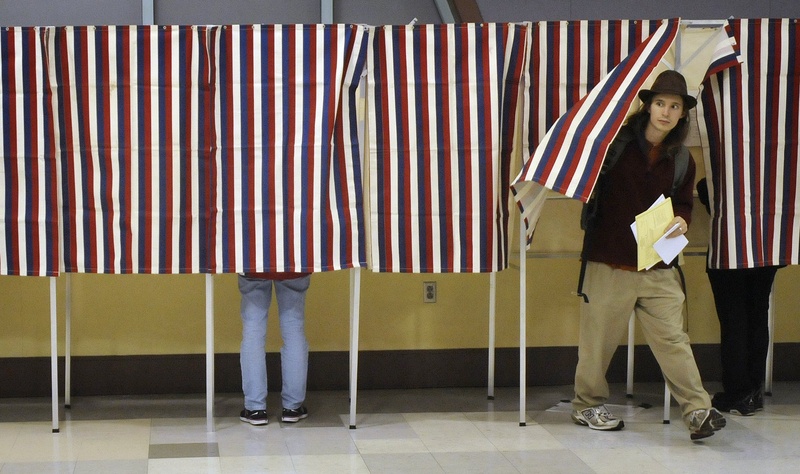It would be easy enough to write off the results of Tuesday’s voting on ballot Questions 2 and 3 as the predictable product of negative campaigning and misleading claims by free-spending opponents of gambling in general and the specific projects at issue in particular.
The developers of the Oxford casino and other gambling interests poured plenty of money into the vote-no campaign against proposed gaming operations in Biddeford, Washington County and Lewiston. Backers of the Lewiston project, especially, complained that they were outspent by folks who were determined to squelch potential competition for Mainers’ gambling dollars.
But the “yes” side, especially proponents of the racino/resort proposed for Biddeford, also waged a compelling and costly campaign. The voters had to choose between the well-argued case for jobs and economic development offered by proponents, and opponents’ claims that gambling causes more problems than it solves.
The voters, by significant majorities, sided with opponents and said “no dice” on both questions.
The rejection of the Biddeford racino was surprising because local residents had previously indicated their support and the developers were clearly willing and able to deliver a first-class facility that was sure to boost the economy of the area. The Lewiston project had always looked like a harder sell for a variety of reasons, so its defeat was not unexpected.
NAIL IN COFFIN
These proposals may have been doomed, in any case, but Gov. LePage undoubtedly drove the final nails into the coffin in the closing days of the campaign when he opined that Maine’s economy could not support five casinos.
He was right, of course, as we pointed out when we endorsed the Biddeford project but recommended a no vote on Lewiston. A casino in that city, we suspected, would have been one too many.
With the election barely in our rearview mirror, the anti-gambling forces — and backers of previously approved casinos — are celebrating their victory. Proponents of the defeated projects, meanwhile, are licking their wounds and wondering what to do next.
And that’s a key question because, election or no election, the debate about gambling in Maine is not over and those who desperately want to tap into gaming’s potential economic benefits are not ready to throw in the towel. Stay tuned.
The argument about Election-Day voter registration, on the other hand, is over, and rightly so. Voters spoke decisively by voting yes on Question 1 and overturning the Legislature’s attempt to do away with a convenience Mainers had accepted and utilized for nearly 40 years.
The Republicans’ legislative majority pushed the bill through amid claims that same-day registration promotes the likelihood of voter fraud and also burdens clerks with unmanageable paperwork on Election Day. Voters saw through both arguments. Try as they might, Republicans were unable to produce any evidence of fraud or even attempted fraud caused by same-day registration. The paperwork rationale was also a red herring.
Whatever their motives in trying to do away with same-day registration — Democrats said the GOP was trying to discourage turnout by voters who might be inclined to favor Democratic candidates — 60 percent of voters saw the debate for what it was: much ado about nothing. Same-day registration is a good thing. It makes it easier for busy Mainers to vote, and there was no reason to tamper with it.
Sometimes, common sense prevails.
FIXING REDISTRICTING.
And it prevailed as well in the case of Question 4, a constitutional amendment to make redistricting more timely and efficient. By giving constitutional authority to the requirement that two-thirds of the Legislature approve any new redistricting plan, Maine can avoid a repeat of last summer’s partisan wrangling over the makeup of congressional districts.
The issue was somewhat overshadowed by more hotly contested questions but voters conscientiously worked their way through the ballot and delivered the right result.
Voters in Cumberland County, meanwhile, also did the right thing by approving $33 million in bonds to renovate the Cumberland County Civic Center. At a time when taxpayers are questioning every penny spent by government, it would have been easy for voters to turn down this crucial project in the name of short-term “savings.”
But allowing the civic center to deteriorate and relinquish its role as an important generator of economic activity would have been far more costly than the financial investment authorized on Tuesday.
Voters wisely ignored the shortsighted arguments against the bonds and accepted their responsibility for maintaining the civic center as a vital element of the local and regional economy.
Send questions/comments to the editors.



Success. Please wait for the page to reload. If the page does not reload within 5 seconds, please refresh the page.
Enter your email and password to access comments.
Hi, to comment on stories you must . This profile is in addition to your subscription and website login.
Already have a commenting profile? .
Invalid username/password.
Please check your email to confirm and complete your registration.
Only subscribers are eligible to post comments. Please subscribe or login first for digital access. Here’s why.
Use the form below to reset your password. When you've submitted your account email, we will send an email with a reset code.